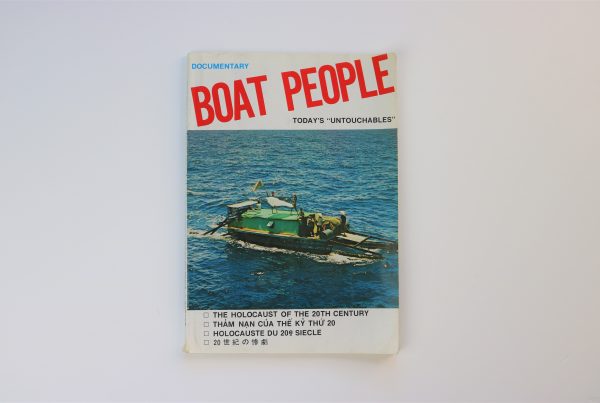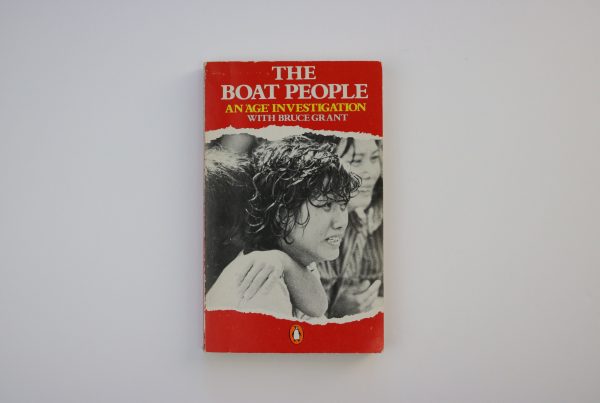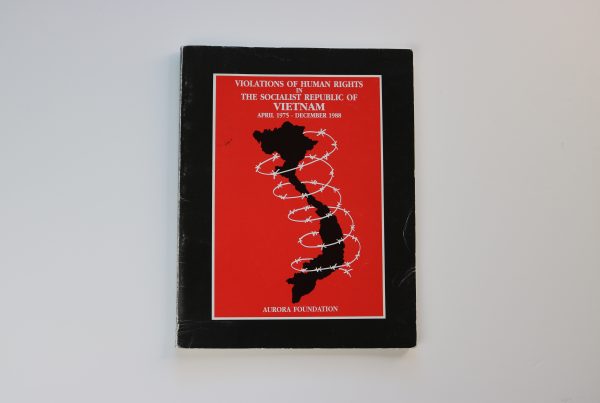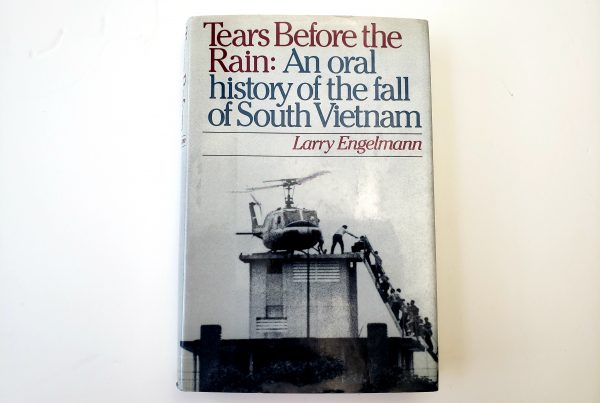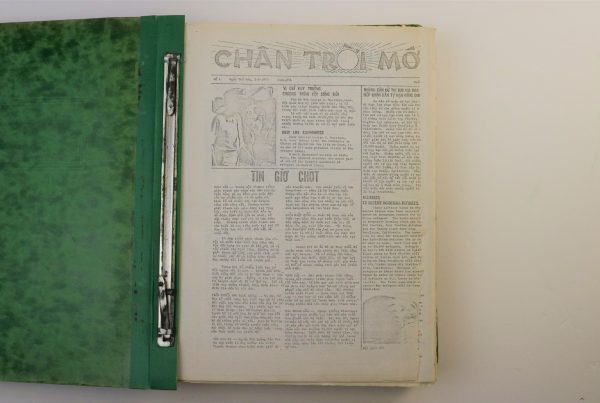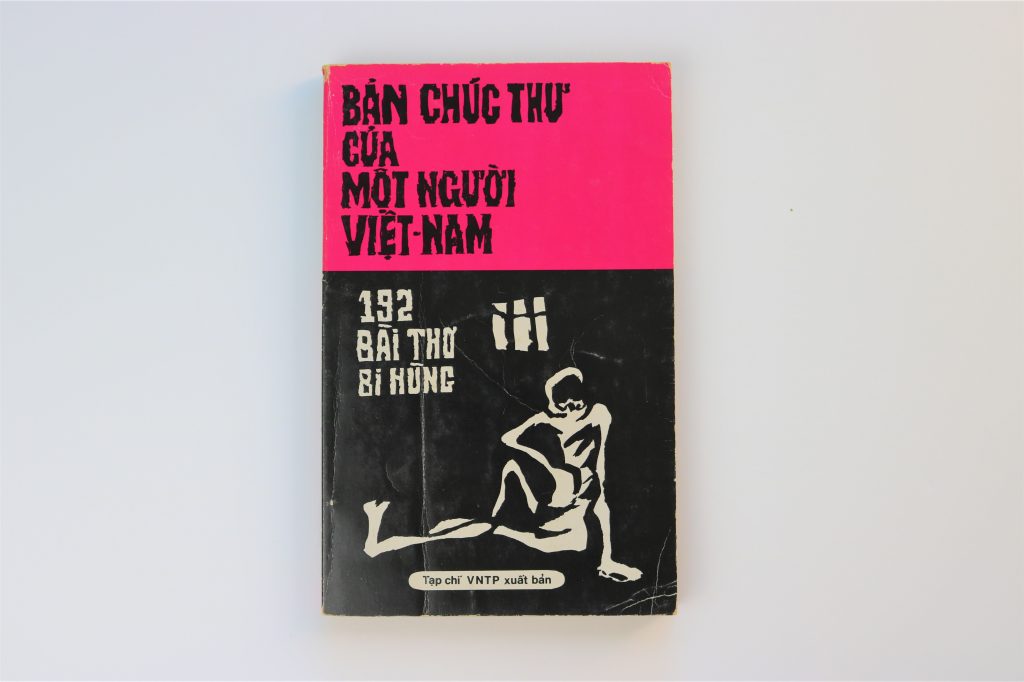
Bibliographic information
| Title | Ban Chuc Thu cua Mot Nguoi Viet Nam |
| Contributor | Nguyen Chi Thien |
| Publisher | Tu Quynh, 1980 |
| Length | 221 pages |
More Information
Donation from Ms. An Nguyen, 2020.
Collected and created PDF by Le Tung Chau
Vietnamese Heritage Museum Collections.
Download PDF version
About the Author
Autobiography of Nguyễn Chí Thiện
I was born in Hanoi on February 27, 1939. My natal village is My-Tho in the district of Binh-Luc, Ha-Nam Province, North Vietnam. My father, Nguyen-Cong Phung, was born in 1898. He died in 1976. Before 1954, he was a low-ranking official of the Hanoi Tribunal. My mother, Nguyen-Thi-Yen, was born in 1900. She died in 1970. She was a little merchant.
I have two sisters: Nguyen-Thi-Hoan, who was born in 1923 and Nguyen-Thi-Hao who was born in 1925. Nguyen-Thi-Hao died in Hanoi in November, 2004. Nguyen-Thi-Hoan lives in Hanoi with her family.
When my parents died I was in a concentration camp called Phong-Quang in Lao-Cai Province. Once my sister Hao visited me there at the request of my mother before her death. My sister’s visit for the purpose of telling me of the death of my mother was the only family visit that I received while imprisoned for fifteen years. This was not due to callous disregard on the part of my family; it was due to deliberate constant changes of prisons and camps by the regime. Because I was not imprisoned with trials, they did not know where I was. They had to hear from released prisoners where I had been, but I would be likely to be moved by that time. Political prisoners were shuffled regularly by jailors so they would not form associations for rebellion or escape.
My brother is Nguyen-Cong-Gian; he was born in 1932. He was a lieutenant-colonel in the Army of the Republic of Vietnam and, like all other officers, was imprisoned in a re-education camp after the communist victory in 1975. His term was for thirteen years (1975-1988). He and his family came to the U.S.A. under the Humanitarian Operation (H.O.) Program, a joint agreement between the U.S. and Vietnam allowing political asylum for military officers of ARVN who had been imprisoned in Vietnam for more than three years. My brother and his family came to the U.S. in 1993, and have lived in Virginia since then. Because the times of both of our imprisonments and surveillance in our homeland did not allow us to meet, I did not see my brother Gian from the time of our youth until I arrived in the U.S.A. on November 1, 1995, a period of forty-one years. He and his family met me at the Dulles Airport.
My family was poor, but my parents did their best to give their sons and daughters a good education. It was beneficial to be the youngest in the family because the older ones helped me to learn. For example, my sister Hao taught me the French language at age six just as she had been taught in the colonial French schools. This longtime use with the language may be the basis for my interest in French novels and poetry as relaxation. My brother Gian was always studious and serious, whereas I was more interested in boxing and swimming as a youth.
During the Resistance against the French Army, which broke out on December 19, 1946, my family moved to My-Tho, our natal village, fifty miles from Hanoi. We lived in the home of a nephew of my father. This was because Hanoi was a battlefield in the war between France and Vietnam and we were fleeing danger. Everyone in Hanoi went to the countryside of the many regions of their births at this time.
At the end of 1949, my family came back to Hanoi, which was then occupied by the French Army. From 1949 to 1956 I went to high school at Nguyen Hue, Minh-Tan, Van Lang, Albert Sarraut, and Khai-Thanh. These were private schools as was common in North Vietnam at that time. After 1950 both boys and girls went to the same schools, but were so timid that we almost never talked to each other.
My sisters had married before 1945 and lived in Hanoi. When necessary we lived at the home of my elder sister, Nguyen-Thi-Hoan, and her husband and children.
On March 9, 1945, when France had been liberated from Germany by the Allied Army, the Japanese made a coup d’etat on only one night and imprisoned the French governor of Vietnam and the French Army. In the void following the Japanese surrender to the Allied Powers in August, 1945, there was a genuine revolution in my homeland. This revolution was bloodless; it was the people taking care of themselves. However it was soon co-opted by the communists with the assistance of the Soviet Union. This was the establishment of the Viet Minh and return of Ho Chi Minh. The nationalist leaders and many supporters of this Vietnamese revolution were soon imprisoned or killed by the communists.
After the Geneva Accords of July 20, 1954, nearly one million people left the North for the South, fleeing communism. My parents decided to stay in Hanoi, believing that the Vietnamese communists were patriots; they had led the people in the fight against French domination, for national independence. Moreover, their doctrine supported the poor.
That naivete would have disastrous consequences. My brother, who had been mobilized in the National Army (quan doi quoc gia) in 1954 was the only one who went to the South, by traveling with the Army. Later, he was a lieutenant-colonel. After the fall of Saigon, he was put in a re-education camp in North Vietnam for thirteen years. During the war he married a lady from Saigon.
I remember the 10th of October, 1954, as if it were yesterday. That was the day Ho Chi Minh and his Party returned to Hanoi. Like everyone my friends and I went out on the streets to welcome him. Our hearts were full of joyous enthusiasm, thinking the red banner with a golden star would brighten our fatherland! At that time, I used to invite some Viet Minh soldiers, victors of Dien-Bien-Phu, to my home for dinner, admiring them as true heroes.
My foolish exuberance, like everyone’s, soon vanished. Perfidy and violence had started their way—trampling down all basic human rights, executing and imprisoning hundreds of thousands of innocent people. Under the totalitarian yoke, the whole country turned into a huge prison. All liberties were pitilessly destroyed. No one could let out one peep against Ho Chi Minh. The Party had gagged the people’s mouths. A terrifying atmosphere pervaded the entire population. French colonialists began to be sorely missed! Compared with Uncle Ho’s socialist regime, the French colonial domination was PARADISE!
Under Ho Chi Minh’s regime, everyone was poor, and did not have enough to eat. However, this made me strong enough to withstand the starvation in the communist prisons, as well as other Vietnamese prisoners who were accustomed to a small diet and are not large people. By contrast, when the French were defeated at Dien Bien Phu and 10,000 soldiers captured and imprisoned, two-thirds of them died with a few months because of privation as well as torture by the Viet Minh using well-known communist methods.
The social changes of the communists began to take effect beginning in 1950, and were firmly in place by 1959. This is the period of my teenage years. My parents quickly began to feel they had made a mistake in not choosing to go South when they had the opportunity in 1954 and 1955.
In 1956, at the age of seventeen, I contracted tuberculosis. Unable to work, I lived a parasitic life. My elderly parents had to nourish me. In the beginning of 1957, my parents and I moved to Haiphong, a harbor town seventy miles from Hanoi. They had to sell our home in Hanoi in order to pay for my treatment, because antibiotics were very expensive. We lived with the family of my elder sister, at 136 Station Street.
Although I said and did nothing against the Party, I had much trouble with Security Forces. The authorities regarded me as “a discontented element” because my brother was in the quan doi quoc gia VN, the National Army.
In December, 1960, a high school history teacher who was one of my friends asked me to assume his task for two hours because he was ill. The required textbook was Cach Mang Thang Tam 1945 (History of the August Revolution), which was published by the Su That Publishing House in Hanoi. The textbook falsely stated that the Japanese surrender in World War II was to the Soviet Army’s victory over the Japanese armed forces in Manchuria. I explained to my students that Japan had surrendered to the Allies because of the two atom bombs dropped on Hiroshima and Nagasaki by the U.S.A.
About two months later I was arrested, accused of “Anti-propaganda,” and condemned to two years in prison. In reality, I had to live three years and six months in labor camps in Phu-Tho Province and Yen-Bai Province. Although labor was hard in these camps, I was still young. Prisoners could talk to one another on our way to and from work, which was primarily agricultural, growing vegetables. About ten of us enjoyed gathering in the yard at dusk to secretly read poetry and discuss literature. This was necessarily secret because the guards would break up groups, especially those who met regularly.
During those years in detention, I created about 100 poems on the subjects of the prison scene and anticommunism. When I was released in 1964, I continued to write poetry and recite it to my closest friends who went on reciting it to others, in Haiphong and Hanoi. We did not have much money so we met in parks, on benches, in the evening. My job at this time was to do bricklaying, especially the carrying of bricks in a basket across my shoulders. The duty of reporting on others, even your own parents or husbands, to the cadres is a norm under the communist reign. Whenever anyone would pass by when we were reading or discussing poetry and politics we would change the subject until they were out of hearing range.
My friends and I rejoiced that the Americans had entered the war on the side of South Vietnam and were bombing Haiphong. We were given careful surveillance by Security Forces at all times because we were suspected of being saboteurs; however the only sabotage that we undertook was that of keeping our minds free of the demands of communism. All over North Vietnam, it was required of everyone to glorify the regime, especially in schools. If not, and the student remained silent, that student would be reported to the Party. Many friends of mine were put in prison because of their mouths.
My parents always loved me and made me feel that I had not done wrong in not adopting the ways and habits of the communists. They blamed themselves for my prison life. If they had only gone South along with my brother, they felt we would have a happy life. We wanted South Vietnam to invade North Vietnam and take over the Communist government, and felt the American bombing was not enough to end the war, let alone to remove the regime.
In February of 1966 I was arrested again. The Security Forces suspected that I was the author of the poems that were transmitted from mouth to mouth in Haiphong and Hanoi. When interrogated, I denied it, saying that I knew nothing about these “reactionary poems.” Without receiving a trial, I was sent to the concentration camps in Phu-Tho, Yen-Bai, and Lao-Cai Provinces.
I never think that I am talented, but that I was able to write poems that affected people because of inspiration, or a sacred fire that was inside me. My vitality of life was put into creating poems even if I was in stocks or irons. I used to work on poems at night, because in the daytime it was too noisy. They took several nights to write, and memorize, and revise the words carefully, before completion. If a poem was not good, I would throw it out of my mind with the same method.
First I would consider the necessary rhythm of the poem. Then I would place the words, the verses, and memorize them. The following night I would repeat them and revise them and commit them to memory. Then I would recite them to my friends in prison camp who were also poets when we gathered after work in the evening. We would help each other.
It was at the Phong Quang camp, in Lao Cai Province, that I gained my closest friendship in life, the poet Phung Cung. Because writing on paper was not allowed, everyone had ways to meter the verses. Phung Cung would use his fingers to count. He would do this with such concentration that other prisoners and jailers thought he was crazy. But he was not, he was simply counting words. I did not use body methods, even reciting aloud, just my memory. Most of my poems (about 300) were created during the second period of imprisonment, eleven years between 1966 and 1977. These are the years of my twenties and thirties.
In July, 1977, (two years after the surrender of South Vietnam) a dozen prisoners and I were temporarily liberated, making room for the increasing number of prisoners who arrived from the South. These dozen included friends and fellow-writers who had come to know each other at the Phong-Quang concentration camp where I had been taken in 1970.
Returning to my elder sister, Mrs. Nguyen-Thi Hoan, and her family, I lived at their home at number 136 Station Street in Haiphong. I was dismayed to find the house also occupied by ten families crammed into the house. Those were families of cadres and party members, of the bloc leader and also of the police officer of this ward by the name of Thanh. The ward police, the district police, the city police often came to “inquire about my health”. Under those circumstances, I did not dare to shut myself in my room of 8 m2 to write. I often rode my bicycle – its brand was a bear but it was so rickety that even a thief would not want to steal it – to an outer suburb to buy a few litres of rice brandy to sell to the dog meat stalls. When the moonshine business was busted, I went to Hanoi. Vu Thu Hien helped me find a job delivering baking flour. Mr. Trinh, a former lieutenant in the National Army, gave me a few sets of bicycle spokes, which I took to Haiphong to sell. That’s how I managed to scrape through. Friends were so preoccupied with survival that they rarely met each other.
Denied any form of employment, I made both ends meet with difficulty. People under the Communist regime always had very little food because of the policy of exporting rice grown in the conquered South Vietnam provinces to other Communist regimes instead of feeding our own people. I often went to bed with an empty stomach even when not in prison. My mother, before she died in 1970, had bought me clothes to wear when I should be released from prison. I had to sell these clothes to buy 8 kilograms (about 19 pounds) of rice to survive.
When Red China invaded the six border provinces, security forces tormented me ceaselessly. Afraid of being unable to survive if jailed a third time, I made up my mind to send my poems abroad. These poems were the first twenty years of my work. It was impossible to let them be buried with me! I went to Hanoi, deciding to run into the French or British Embassy. It took me three days to write four hundred poems from my memory on papers. So, on July 16th, 1979, I put my manuscript under my shirt and went to the British Embassy on Ly-Thuong-Kiet Street.
I found my way into the Embassy, passing the guard. One Vietnamese woman and three Vietnamese men were sitting around a table in a large room. They were civil servants hired by the British to be a local reception office for the Embassy. I told them that I came to see the Ambassador.
“Where are you from?” one of them asked. “From the foreign office,” I answered. They demanded the required paper. I told them I had forgotten to carry it. With that, I rushed to the door at the other side of the room. The woman stood up and grasped me. I pushed her down. Two men barred my way into the room. The third Vietnamese man went out to warn the police.
There was a young English girl combing her hair in a boudoir without a door on my right side. I said to her quickly in English: “I need to meet the Ambassador. Don’t fear, I am an honest man.” But she was so frightened that she dropped her comb. The two men chased me. I ran to the table and lifted it up, making everything on the table fall to the floor. Hearing the noise, three English diplomats came out. One Vietnamese man said that I was a madman. I said to the three Englishmen that I was not crazy, and I had important documents to give them. I immediately ran in the back door. The Englishmen followed me, closing the door.
I handed them my manuscript and told them about my prison life and the sufferings of my oppressed people under the communist totalitarian yoke. I begged them to have my poems published in their free country. Finally, I asked whether I could stay in the Embassy. They replied that I could not because the police were waiting for me outside. They promised solemnly that they would arrange for my poems to be published.
Satisfied, I gave them three photos. One was taken in 1958 with my parents and my niece and nephew; one was taken in the same year when I was nineteen years old, and the third one was taken in 1978, when I was thirty-nine. I shook hands with them, said good-bye, and left the Embassy. The Security Forces of the Socialist government of Vietnam arrested me in front of the British Embassy, and drove me to Hoa-Lo prison, which had been ironically called the “Hanoi Hilton” by U.S. pilots who had been shot down by Russian SAM missiles when bombing or flying reconnaissance over North Vietnam from 1967 until 1973. The original handwritten manuscripts are in the protective custody of the British government in London. They will be returned when Vietnam is free.
The Hoa Lo prison is the setting of my short stories which are based on real situations and people I knew when I was there for six years. The first three years I was in a solitary cell, in darkness. The second three years I was with common criminals. Sometimes women were in cells nearby, but mostly prisoners were gender-separated in large rooms containing about 200 people each. I was able to communicate with women when in cells, and especially enjoyed hearing them sing folk songs that I remembered from my youth. I was in cell #14. We would communicate with each other when the jailers were not there by yelling back and forth and by a system of “driving” items such as toothbrushes and other goods for trade by strings thrown to the next cell. Each person was honor-bound to deliver the item to the cell of its intended recipient and not break the chain.
I survived the terrible ordeal of prison conditions because my companions in the Hoa Lo prison, even common criminals, admired my resistance to the communist authority. They protected me as much as they could by giving up some of their small space to lie down so that I did not have to always sleep on my side.
In 1985 I was transferred from Hoa-Lo prison to B14, in Thanh-Liet village, eight miles from Hanoi. I was living there in cells where Mr. Vo Dai Ton, a fighter for democracy, was living. Other political prisoners at B14 included Hoang-Minh Chinh, Duong-Thu-Huong, Ha-Si-Phu, and Nguyen-Thanh-Giang. My health deteriorated badly due to more solitary confinement and malnutrition. The interior fire of creation went out, and after 1988 I composed no more poems because I could not concentrate.
In the ten-year period between 1977 and 1988 I created 400 poems. However, I forgot 100 of them when I was reciting them to myself after my release in 1991. I spent one year after my release to call back to my memory the 300 poems that I would write down on paper on a single day after I came to the United States, November 1, 1995.
In 1988 I was transferred to Z10 in Ninh Binh Province, seventy miles from Hanoi, where a communist general named Chu-Van Tan’s several relatives were also jailed. This was a segregated prison for Chinese supporters suspected to be spies.
Although isolated from society, I always found ways to communicate and get news from the newly arrested prisoners. That is how I learned the events of the war as they unfolded. Sometimes new prisoners were Communist Party members who had the courage to criticize their superiors.
Thanks to the collapse of the socialist regimes in Eastern Europe and the pressure of the Vietnamese Diaspora to call my situation to the attention of international opinion, I was released in October, 1991, after more than twelve years of imprisonment in my third period of being jailed without trial. Eight of those years were in solitary confinement, and in very dim light. When I was released I weighed only eighty pounds; today I weigh 139 pounds.
After my release from the third period of imprisonment, which I did not expect to survive, I knew that my poems had been published as promised by the Englishmen, first in October, 1980. I learned this in prison when angry officials showed me a book and asked if they were mine. I said that I was the author. I was very happy because I had attained my goal. They were submitted to an international poetry competition and awarded the International Poetry Award in Rotterdam in the year 1985.
All unknown to me, they were translated into several languages: English, French, German, Dutch, Chinese, Spanish, Czech, and Korean. The English translation by Huynh Sanh Thong was published as the first volume in the Lac Viet Series by the Council on Southeast Asia Studies at Yale University in that same year as Flowers From Hell. In 1988 they were translated into German by Dr. Bui Hanh Nhgi and published as Echo Aus Dem Abgrund, Tieng Vong Tu Day Vuc by R.G. Fischer Verlag with an introduction by the musician Peter Gabriel. The Vietnamese musician Pham Duy who had found refuge in America set many to music as “Prison Songs” and performed them around the world.
All of this was unknown to me while I was in solitary confinement in my homeland for creating these verses with the rhymes and rhythms of freedom and resistance to tyranny. My whereabouts and my condition, whether alive or dead, was unknown to the translators and publishers. However, people all over the world were watching and I was given the “Freedom to Write” award in 1988. Perhaps it was for this reason they did not kill me.
The last three years of my imprisonment, 1988 to 1991, saw annual changes in my location. In my struggle for survival, it no longer mattered to me where I was. The numbered camps, B14 and Z10, were for people considered dangerous. In 1990 I was transferred to Ba Sao camp, in Ha Nam Province, very near to my natal village. This was a transition for my return to the outside world in 1991.
From 1991 to 1995 I was living in Hanoi with my second sister’s Hao’s family at 65 Nguyen-Cong-Tru Street, under strict surveillance. Everyone who came to see me was later threatened by the police. After diplomatic normalization between the U.S.A. and Viet-Nam I was allowed asylum in the U.S.A. under the Humanitarian Operation program. This was due to the efforts of humanitarian organizations and especially efforts of a retired U.S. Air Force colonel who lives in California, Noboru Masuoka.
The story of Col. Masuoka’s concern is an interesting one. He was the admissions officer of the Air Force Academy in Colorado. His own history includes incarceration at Heart Mountain, Wyoming, concentration camp in the United States during World War II. All persons of Japanese descent, citizens or not, were moved from their homes and their land confiscated. When “Nobby” met young Vietnamese students who had qualified for admission to the Air Force Academy, they told him of their South Vietnamese Army officer fathers who were still imprisoned in Vietnam. He was able to arrange the release of two officers and their emigration to America.
When asked by a television reporter in San Jose if he could aid a poet to leave the country who had never been a military or civilian official it was a challenge. But he worked with humanitarian organizations and government officials in Washington D.C. to get my release to improve my health. This release finally came on November 1, 1995. Upon my arrival I was asked to address the Congress of the United States, which I did in English, from my speech translated by Nguyen Ngoc Bich. It has since been translated into French. I also addressed the Parliament and the President of France, Jacques Chirac, in the year 2000.
During the last twelve-year period of detention I created about 300 poems. I had to keep them in my head. When arriving in the U.S.A. I hurried to write them on paper, fearing that the poems would leave my mind. The new poems were translated by Nguyen Ngoc Bich, a scholar who has written and published extensively on Vietnamese history and culture. He has been overseas for nearly forty years and his English is very good. I had the poems published in 1996.
I lived with my brother Gian’s family in Herndon, Virginia, until 1998, when I went to France at the invitation of the International Parliament of Writers. During three years in France (1998 – 2001) I wrote six stories of life in Hoa-Lo prison, where I had been incarcerated following my arrest outside the British Embassy in Hanoi from 1979 until 1985. These stories were not fiction; they were based on real experiences. Many incidents are of my own life in prison.
They were published in Vietnamese by Canh Nam publishers in Arlington, Virginia, in 2001. They have been translated into English by several friends who volunteered their energy and skills and I am seeking their publication in America.
In 2001 I moved to southern California, to live in the warm weather and the largest population of Vietnamese Diaspora in America. California’s climate and associations with friends has improved my health. I live as a lodger in a Vietnamese family home. I learned English and became a citizen of the U.S.A. on October 20, 2004. I give lectures and readings especially to remember the people imprisoned with me and those who are still imprisoned. I intend to write a very thorough and lengthy memoir in my original language, Vietnamese.
During my twenty-seven years of imprisonment, with no books or magazines to read, I devoted all my spare time (especially at night) to create my poems, learning them by heart. It would have been too risky, too dangerous to write them on paper. For me poetry was no luxury, it was the cruel realities of life of war and prison, the sound of sobbing of my oppressed and mercilessly tortured compatriots. It was the memory of my parents, who are always in my mind, and their love and sacrifice for their children, especially their youngest who was born to them so late in their lives and caused them such tribulation. It was not hate, but hope that kept me alive. It was the remembered sights and sounds of the street vendors and lovely girls, the coffee shop of my youthful friends wasting time in a careless way that became the hope of my miserable life. It was the remembered sights of sunset and dawn and the landscape of my homeland, sometimes only seen while laboring in the dreary concentration camps but always beautiful in the darkness of my solitary cell and unshackled imagination.
Yet the solitude continues as I am away from so many friends in my homeland, and grows deeper as they grow old and pass away. Since living in the United States, I often make telephone calls to inquire about my family, my friends. In January, 1997, on a Saturday evening, my friends gathered at the home of Captain Kieu Duy Vinh waiting for my phone call. Right at the beginning of our conversation, Le Quang Dung, the poet, told me that the poet Phung Cung, who had lived with me in prison where we had made life bearable for each other had just passed away on Friday at his home, after two weeks of severe illness. My friends were about to go to his funeral. I was thunderstruck and heartbroken. So he had gone forever and I would never have the chance of seeing him again, of watching his pensive look, of drinking a cup of tea with him and listening to his poetry.
Death is inevitable, but still I could not help feeling an excruciating sense of loss and I wept! That night, I lay down, my face against the wall. I remembered the months and years we were together. I recalled the day we met for the first time at Phong Quang, on a sombre winter day when he was standing before a red pepper plant, gazing at the leaden grey sky with an equally leaden look on his face. Then, on the day when I said good-bye to him to leave for Saigon on my way to the United States, he had held my hands not wanting to let go, his eyes brimming with tears. Very early in the morning, drifting into a doze, I dreamed of the stars, the azure blue sails flying with the wind on the Milky Way, taking his soul to the Merciful Almighty! One day, when returning to Vietnam, there will be nothing I can do but to stand in silence before a cattle-trodden mound at the end of a hamlet, where his body has been laid to rest.
I have always thought it was a miracle and destiny that I could survive. Many friends of mine, much healthier and stronger than I, died from hunger, cold, and hard labor. Graves are everywhere on the hills around the camps. Over one million people have left our homeland for Europe, Australia, and America. At least half that number additionally have died in the attempt to escape from the communist regime.
My dearest wish was, is, and will be to see everyone wake up to the fact that Communism is a great catastrophe of mankind, as people have awakened to the Nazi scourge.

Autobiography © 2005 Nguyen Chi Thien, author and Jean Libby, editor
Source: https://vietnamlit.org/nguyenchithien/autobiography.html



